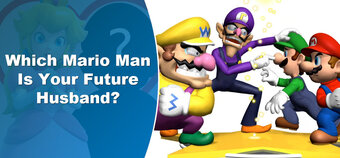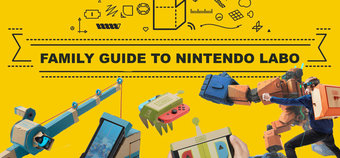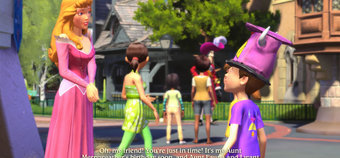If there's one thing there's nowhere near enough of on consoles these days, it's decent party games. Something the Wii (and Wii U) got so right with so many games, there's been a real dearth of games on other platforms that encourage you to grab a controller, squeeze up on the sofa, and bed in for some good local multiplayer fun - especially if you're looking for something everyone can play. Spotting a gap in the market, the folks at Curve Digital have been hard at work on Jump Stars for some time - but does it have what it takes to become a go-to party hit?
Like many games, Jump Stars gets the ball rolling with a fairly wacky concept. Choosing to play as one of dozens of different box-like characters, each with its own theme (and often pun-tastic name), you find yourself taking part in a gameshow run by a box-based presenter, who seems to have lost his marbles. Having gone a little bit mad and turned his once perfectly safe gameshow into a death defying battle to the finish, it's up to you to work with your team to survive each stage, while competing for points in order to be named the overall winner.
What follows is a series of co-op-yet-competitive mini-games, where your host with the most will regularly pop up to insult, lambast, and otherwise distract you as you try your best to survive his tricky creations. With support for up to four players on the same console, and fairly simple controls, this is a game that's really easy to pick up and play, and all you'll really have to worry about is timing your jumps right - and punching your "friends" should they get in your way, with L2 and R2 (on the PS4) letting you punch left and right, while L1 and R1 let you punch upwards.

Each of the stages has a different, pop-up style theme
However, while the main menu may list 25 different stages, each level actually fits into one of 10 different mini-game types, with some modes having more variants than others. From the simple, like Tailspin, which sees you (and your friends) having to jump over a beam or arm that slowly starts rotating faster and faster, to the more complex, like Hunger Pains, which sees your character slowly growing thinner as time goes on, and asks you to eat the pies that pop up over the stage in order to stay alive, there's a decent variety of games here - although perhaps not as many as we'd like.
Some games require more teamwork than others. On Downfall, you find yourself on a stage that's constantly moving upwards - the only issue is, you need to go down. The only problem is, there's only a handful of holes in the floor you can actually use to go down - and most of them are blocked by a coloured barrier. As you've probably guessed, it's up to the relevantly coloured team mate to speed to the rescue, smash through the barrier, and let the rest of the team through. On games like Cool Aid, meanwhile, working as a team is actually nigh on impossible. With each character slowly starting to catch fire, the only way to not ignite is to stop for a breather on one of the few temporary ice platforms. Of course, with fewer platforms than there are people, this one can turn into a real brawl to a finish.
Often, though, it's the simple games that work the best - like Stomp, a battle for survival which hangs giant hammers above a narrow platform, each of which has a tendency to come crashing down at the most inopportune moments. Scramble, meanwhile, is another simple-but-goodie, as all you really have to do is constantly jump upwards to scale a load of constantly falling platforms - just make sure you don't end up touching the floor!

Jump!
No matter which stage you're playing, though, there are always a few constants across each mini-game. Perhaps the most important is that there'll almost always be some sort of coloured platform, somewhere in the level, which you'll need to try and get to when it lights up in your colour. Landing on the pad will earn you team points, which not only adds to your team score, but also will determine who's the overall winner and loser. Once you've touched the pad, it'll change colour, and it's up to your team mate to get there to keep the points rolling in.
Another constant between stages is that if you start to do too well, the game will do something to try and make things harder. At various points, you'll see a card pop up on screen and start rotating, before shrinking back into the top corner - this signals that the game's applied a modifier, although quite what the modifier does isn't always immediately clear. Some flip the screen upside down, others invert your controls, while one of our least favourites makes the floor act like it's made out of ice, making any platforming that much trickier. And that's all fair enough - but the problem is you don't really get enough warning that the changes are coming. With so much to keep your eye on in each level, it's almost impossible to track what the card landed on, yet alone try and decipher what the picture actually shows. Having your controls suddenly, and unexpectedly warp without warning certainly makes the game harder, but it doesn't half feel unfair - especially as all it really needs is for the ever-present announcer to shout out what's about to happen.
However, while it may tick a lot of the right boxes, Jump Stars never quite gets that "one more go" feeling right - it's the sort of game you may have a few short blasts on, but one that's unlikely to become a regular staple of your Friday night fun. Whether it's down to a general lack of variety in the games, or the fact that what is here can often be a bit on the confusing side, we're not sure, but there's definitely that bit of special sauce that seems to have sadly missed Jump Stars out.

Needless to say, the whole stage turning upside down can easily throw you off your rhythm.
One of the most unusual moves, however, is that there's actually no single player mode here. And by that, we don't mean there's no elaborate story mode or anything - we mean you actually can't play it by yourself. With no computer controlled opponents, the only people you'll end up playing against are the people who can cram on your sofa, meaning you'll need a minimum of two players to actually do anything on this - and that'll leave you having a lot less fun than you otherwise would if you were playing with four. It's a really strange decision, and one that's essentially going to make the game a much harder sell if you don't regularly have four people round your house, and four controllers for them to use - after all, competing with just your sibling isn't quite as much fun as it would be if you could cram a few more players in.
Still, with a budget price of just £7.99, what's here is fun enough, so long as you know what you're letting yourself in for. If you've got a group of friends, and you've been dying for something to play in between endless sessions on Mario Kart and Smash Bros, then this could be well worth a look. But if it's just you and your sibling/partner that plays, whether you get Jump Stars or not is a much trickier decision.
Format Reviewed: Playstation 4





















